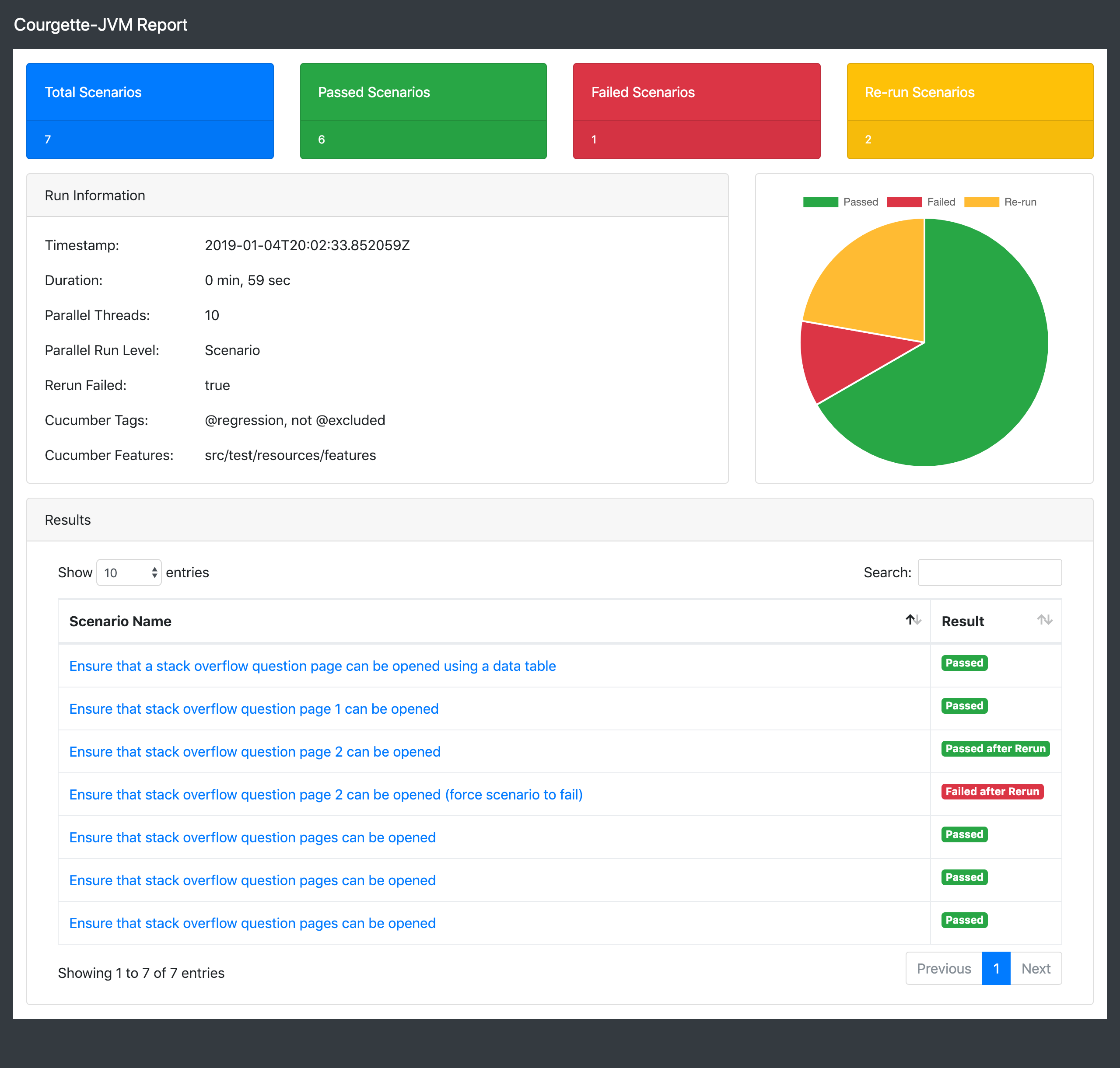Courgette-JVM is an extension of Cucumber-JVM with added capabilities to run cucumber tests in parallel on a feature level or on a scenario level. It also provides an option to automatically re-run failed scenarios.
- All features can be executed in parallel on independent threads.
- All scenarios can be executed in parallel on independent threads.
- Automatic re-run of failed scenarios.
- Requires only 1 annotated class to run all feature files in parallel.
- Single report generation for all executed features including embedded files (Json and Html reports)
- Single re-run file listing all failed scenarios that occured during parallel execution.
- Supports Cucumber-JVM 4
- Supports JUnit and TestNG
- Can be used with Gradle and Maven.
- Searchable and paginated Courgette-JVM Html Report which includes all step definitions, embedded screenshots, thrown exceptions, pie chart and Courgette run information.

- Java 8
- Java 9 and 10 (supported from version 2.3.1)
- Java 11 (supported from version 3.0.0)
Repository: jcenter
<repositories>
<repository>
<id>jcenter</id>
<url>https://jcenter.bintray.com/</url>
</repository>
</repositories>
<dependency>
<groupId>io.github.prashant-ramcharan</groupId>
<artifactId>courgette-jvm</artifactId>
<version>3.2.0</version>
</dependency>repositories {
jcenter()
}
compile 'io.github.prashant-ramcharan:courgette-jvm:3.2.0'- cucumber-core 4.2.0
- cucumber-java 4.2.0
- cucumber-java8 4.2.0
- cucumber-junit 4.2.0
- testng 6.14.3
- jackson-databind 2.8.8
Example projects:
Courgette-JVM supports JUnit and TestNG to run cucumber features and scenarios in parallel. A JUnit runner class must be annotated with @RunWith(Courgette.class) and a TestNG runner class must extend TestNGCourgette.
-
threads : The number of concurrent threads to run cucumber features.
- Example: If you have 10 cucumber features and you use 6 threads, 6 features would first run in parallel then the following 4 features would run in parallel.
-
runLevel : Options are CourgetteRunLevel.FEATURE or CourgetteRunLevel.SCENARIO
- If set to feature level, all features would run in parallel. If set to scenario level, all scenarios would be run in parallel.
-
rerunFailedScenarios : If set to true, any failed scenario will be immediately re-run in the same thread. If the re-run succeeds, the initial failure will be ignored and not cause the build to fail.
-
rerunAttempts : The number of re-run attempts for a failed scenario. (rerunFailedScenarios must be set to true)
-
showTestOutput : If set to true, the output for each feature will be redirected to the current I/O source or destination.
-
reportTargetDir : Target directory where courgette-report is generated. Set to target by default.
-
cucumberOptions : The standard cucumber options for specifying feature paths, glue, tags etc..
-
At the end of the test run, a single report ( if included in the cucumberOptions ) listing all executed features and scenarios will be created in the specified report path. All embedded images will be placed in the images folder in the specified report path.
-
A courgette-rerun.txt file listing all failed scenarios will be created in the specified rerun plugin path or the target folder ( default )
-
A Courgette-JVM Html report will be created in the reportTargetDir (defaulted to the target directory).
@RunWith(Courgette.class)
@CourgetteOptions(
threads = 10,
runLevel = CourgetteRunLevel.SCENARIO,
rerunFailedScenarios = true,
rerunAttempts = 1,
showTestOutput = true,
reportTargetDir = "build",
cucumberOptions = @CucumberOptions(
features = "src/test/resources/features",
glue = "steps",
tags = {"@regression", "not @wip"},
plugin = {
"pretty",
"json:build/cucumber-report/cucumber.json",
"html:build/cucumber-report/cucumber.html",
"junit:build/cucumber-report/cucumber.xml"},
strict = true
))
public class RegressionTestSuite {
}@Test
@CourgetteOptions(
threads = 10,
runLevel = CourgetteRunLevel.SCENARIO,
rerunFailedScenarios = true,
rerunAttempts = 1,
showTestOutput = true,
reportTargetDir = "build",
cucumberOptions = @CucumberOptions(
features = "src/test/resources/features",
glue = "steps",
tags = {"@regression", "not @wip"},
plugin = {
"pretty",
"json:build/cucumber-report/cucumber.json",
"html:build/cucumber-report/cucumber.html"},
strict = true
))
public class RegressionTestSuite extends TestNGCourgette {
}tasks.withType(Test) {
systemProperties = System.getProperties()
systemProperties.remove("java.endorsed.dirs") // needs to be removed from Java 9
}
// JUnit
task regressionSuite(type: Test) {
include '**/RegressionTestSuite.class'
outputs.upToDateWhen { false }
}
// TestNG
task regressionSuite(type: Test) {
useTestNG()
include '**/RegressionTestSuite.class'
outputs.upToDateWhen { false }
}To override the hard-coded courgette options (threads, runLevel, rerunFailedScenarios, showTestOutput, reportTargetDir) set in the runner class, you can provide system properties to the gradle task.
gradle regressionSuite -Dcourgette.threads=2 -Dcourgette.runLevel=FEATURE -Dcourgette.rerunFailedScenarios=false -Dcourgette.showTestOutput=true -Dcourgette.reportTargetDir=build
To override the hard-coded cucumber options (tags, glue, plugin, name, junit) set in the runner class, you can provide comma separated system properties to the gradle task.
gradle regressionSuite -Dcucumber.tags="@regression, ~@bug" -Dcucumber.glue="steps, hooks"
To specify non standard VM options (-X options)
gradle regressionSuite -Dcourgette.vmoptions="-Xms256m -Xmx512m"
You can add global setup and tear-down code to your Courgette test runner using the @CourgetteBeforeAll and @CourgetteAfterAll annotations. For example:
@RunWith(Courgette.class)
@CourgetteOptions(/* Your Courgette options here... */)
public class RegressionTestSuite {
@CourgetteBeforeAll
public static void setUp() {
System.out.println("I will run before any tests execute");
}
@CourgetteAfterAll
public static void tearDown() {
System.out.println("I will run after all of the tests execute");
}
}You can add any number of annotated methods to your test suite class.
If you need your callbacks to run in a specific order, pass order to the annotation: @CourgetteBeforeAll(order = 2).
-
JUnit test notifier is not updated when running features in the IDE during parallel test execution.
- Each feature is run using the Cucumber CLI and because of this JUnit is not notified off the test result. The workaround to this is the Courgette-JVM html report which lists all test passes, failures and re-runs. Alternatively, you can review the Cucumber reports or the results from the build tool.
-
When there's a failure in the feature and your runner is set to 'runLevel = CourgetteRunLevel.FEATURE' and 'rerunFailedScenarios = true', the re-run cucumber feature report will override the original cucumber feature report.
- Use CourgetteRunLevel.SCENARIO which resolves this issue and retains all results in the cucumber report.
-
The following error is returned: "java.io.IOException: Cannot run program "java": CreateProcess error=206, The filename or extension is too long" [Windows OS Only]
- This is a known Windows Create Process issue and is related to the classpath exceeding the maximum length of 32K characters. To workaround this, please upgrade to either Java 9/10/11 and Courgette 3.0.0 as Courgette uses the Java Platform Module System instead of the URL classloader.
For any issues or requests, please submit here



